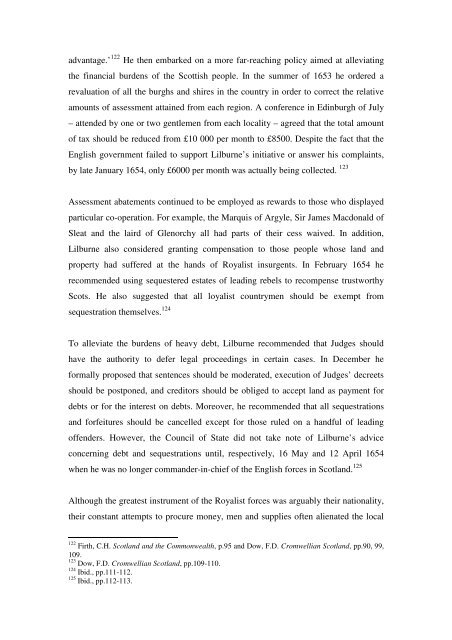The Glencairn Uprising, 1653-54 Helen Baker Department of ...
The Glencairn Uprising, 1653-54 Helen Baker Department of ...
The Glencairn Uprising, 1653-54 Helen Baker Department of ...
Create successful ePaper yourself
Turn your PDF publications into a flip-book with our unique Google optimized e-Paper software.
advantage.’ 122 He then embarked on a more far-reaching policy aimed at alleviating<br />
the financial burdens <strong>of</strong> the Scottish people. In the summer <strong>of</strong> <strong>1653</strong> he ordered a<br />
revaluation <strong>of</strong> all the burghs and shires in the country in order to correct the relative<br />
amounts <strong>of</strong> assessment attained from each region. A conference in Edinburgh <strong>of</strong> July<br />
– attended by one or two gentlemen from each locality – agreed that the total amount<br />
<strong>of</strong> tax should be reduced from £10 000 per month to £8500. Despite the fact that the<br />
English government failed to support Lilburne’s initiative or answer his complaints,<br />
by late January 16<strong>54</strong>, only £6000 per month was actually being collected. 123<br />
Assessment abatements continued to be employed as rewards to those who displayed<br />
particular co-operation. For example, the Marquis <strong>of</strong> Argyle, Sir James Macdonald <strong>of</strong><br />
Sleat and the laird <strong>of</strong> Glenorchy all had parts <strong>of</strong> their cess waived. In addition,<br />
Lilburne also considered granting compensation to those people whose land and<br />
property had suffered at the hands <strong>of</strong> Royalist insurgents. In February 16<strong>54</strong> he<br />
recommended using sequestered estates <strong>of</strong> leading rebels to recompense trustworthy<br />
Scots. He also suggested that all loyalist countrymen should be exempt from<br />
sequestration themselves. 124<br />
To alleviate the burdens <strong>of</strong> heavy debt, Lilburne recommended that Judges should<br />
have the authority to defer legal proceedings in certain cases. In December he<br />
formally proposed that sentences should be moderated, execution <strong>of</strong> Judges’ decreets<br />
should be postponed, and creditors should be obliged to accept land as payment for<br />
debts or for the interest on debts. Moreover, he recommended that all sequestrations<br />
and forfeitures should be cancelled except for those ruled on a handful <strong>of</strong> leading<br />
<strong>of</strong>fenders. However, the Council <strong>of</strong> State did not take note <strong>of</strong> Lilburne’s advice<br />
concerning debt and sequestrations until, respectively, 16 May and 12 April 16<strong>54</strong><br />
when he was no longer commander-in-chief <strong>of</strong> the English forces in Scotland. 125<br />
Although the greatest instrument <strong>of</strong> the Royalist forces was arguably their nationality,<br />
their constant attempts to procure money, men and supplies <strong>of</strong>ten alienated the local<br />
122 Firth, C.H. Scotland and the Commonwealth, p.95 and Dow, F.D. Cromwellian Scotland, pp.90, 99,<br />
109.<br />
123 Dow, F.D. Cromwellian Scotland, pp.109-110.<br />
124 Ibid., pp.111-112.<br />
125 Ibid., pp.112-113.
















